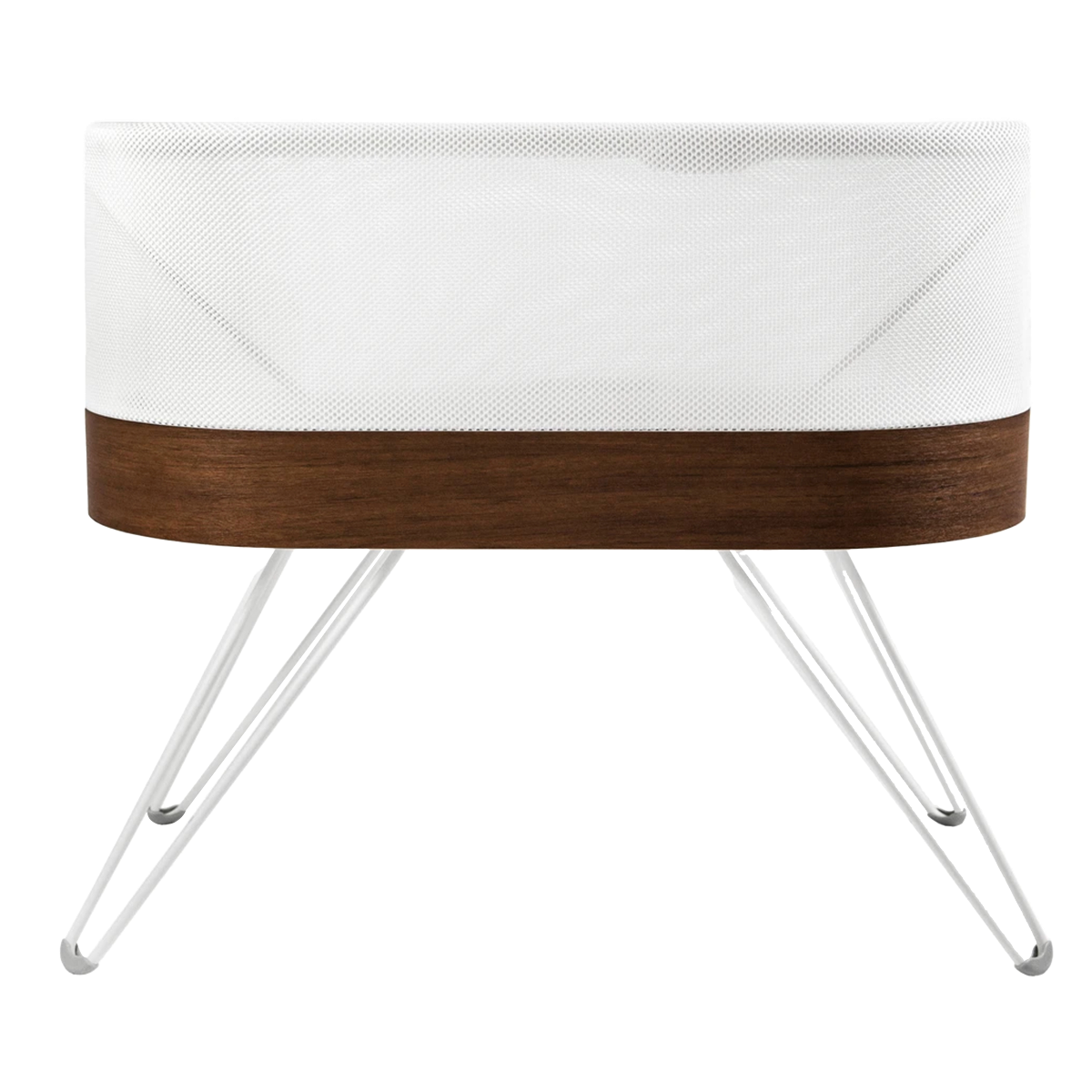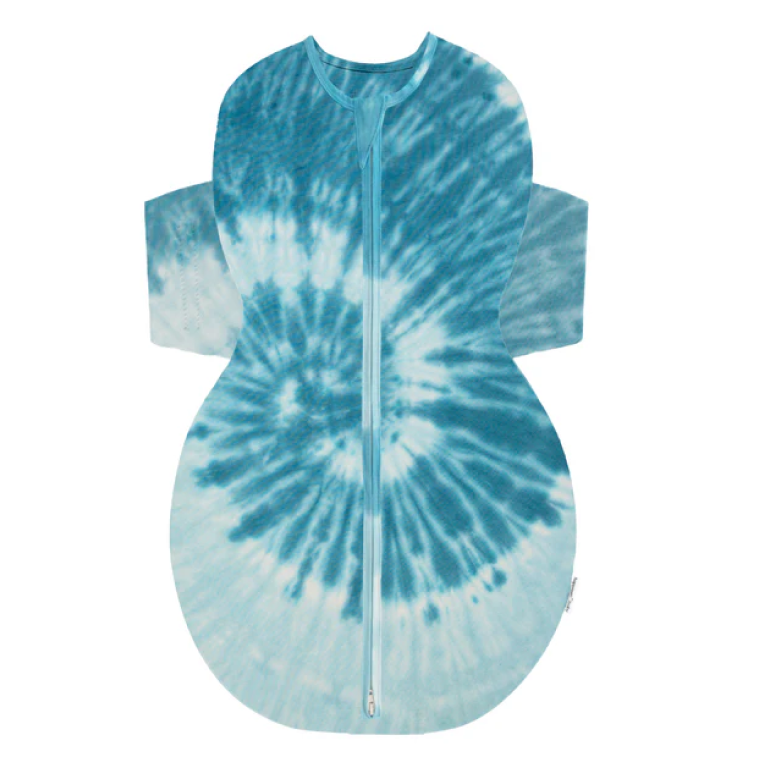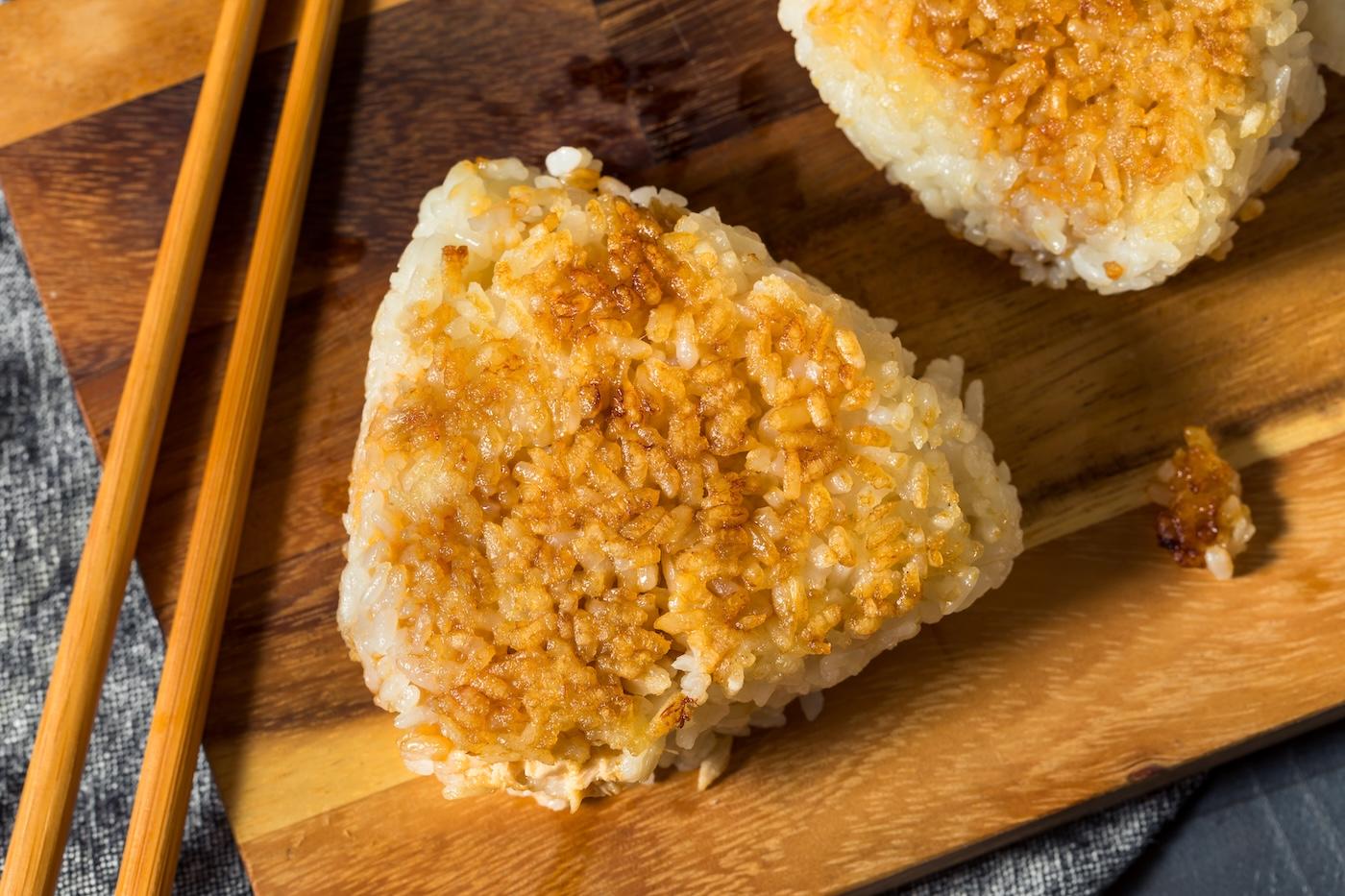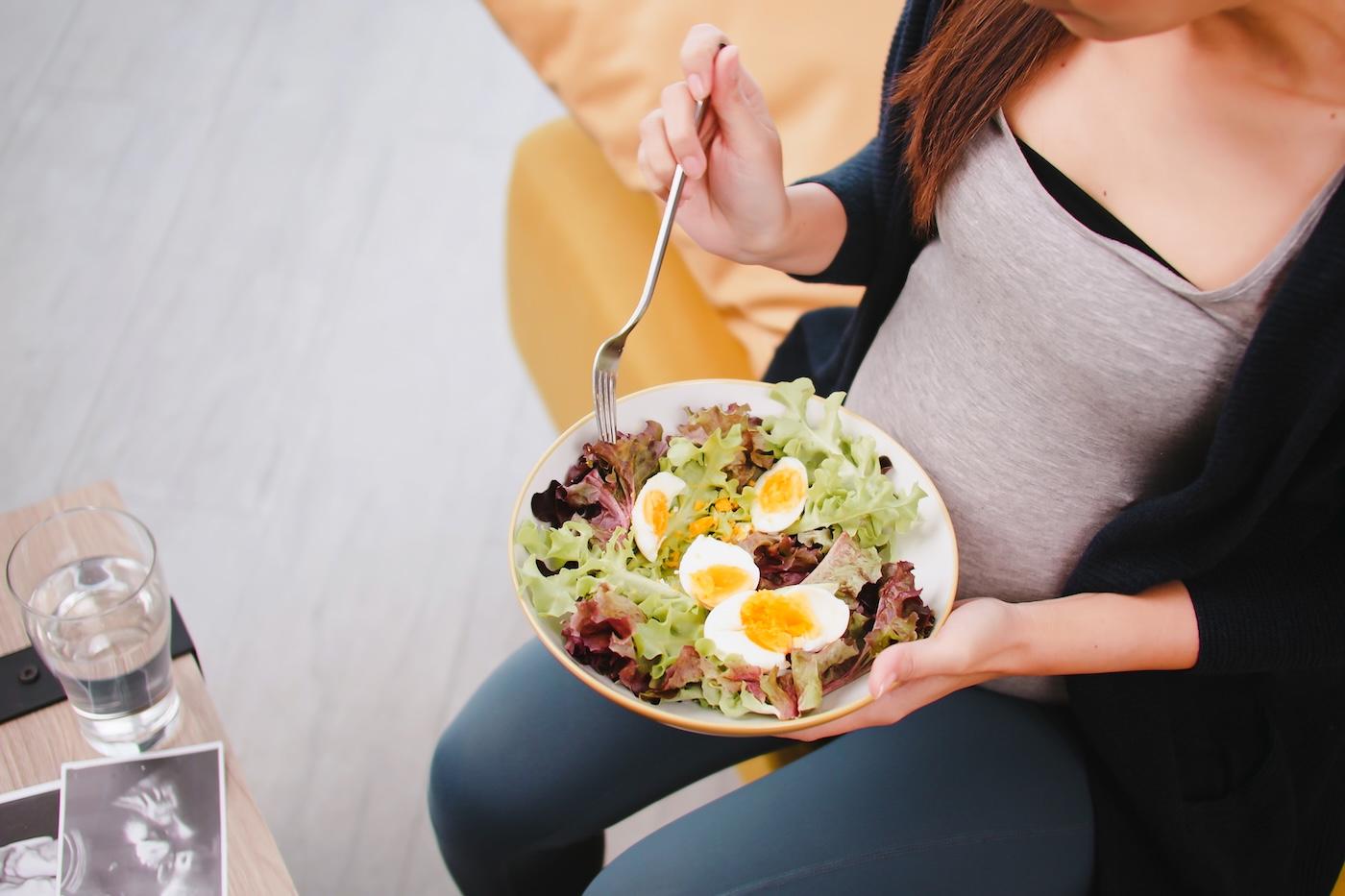PREGNANCY
Natural Ways to Relieve Pregnancy Heartburn
If you’ve been feeling the burn, read on to learn how to conquer this common pregnancy discomfort.

Written by
Gabrielle McPherson, MS, RDN, LDN

Before you were expecting, you probably imagined that bringing a baby into the world would take a lot of heart…what you may not have seen coming was the heartburn that often accompanies pregnancy, too.
Acid reflux is one of the top digestive complaints of pregnant folks. Symptoms of acid reflux are no joke and can be severe enough to interfere with work and life. And one major acid reflux symptom is heartburn, which affects 17 to 45% of pregnancies. If you’ve been feeling the burn, read on to find out how to conquer this common pregnancy discomfort.
What is heartburn?
Understanding heartburn takes a quick anatomy lesson (one that—despite what the name implies—actually has nothing to do with the heart!). A long tube called the esophagus joins your mouth to your stomach. Your esophagus has a muscle that functions as a gate after you eat. Its job is to keep food bits and digestive juices in the stomach where they belong. But in pregnancy, this muscle doesn’t function normally. The gate starts allowing your acidic stomach contents to flow back into the esophagus, causing a burning sensation in your chest and throat. That uncomfortable burning sensation is called heartburn.
What causes pregnancy heartburn?
The exact causes of heartburn in pregnancy remain a mystery. However, some studies suggest it may be due to an increase in progesterone (a pregnancy hormone), relaxation of the smooth muscle, or the growing uterus applying pressure to the stomach. Heartburn can be brutal in the second and third trimester, but take heart (pun intended!); it usually subsides after the baby arrives. Until then, there are plenty of natural ways to ease your heartburn.
Eating Tips for Heartburn Relief
Eat more high-fiber foods to relieve pregnancy heartburn.
Fiber is a healthy carbohydrate found in many plant-based foods…and there are lots of good reasons to add it to your plate during pregnancy. For one (or should we say two) it’s not uncommon to have trouble going #2 when you’re expecting, and fiber-filled foods help get things moving.
Because of fiber’s knack for hustling foods more quickly through the digestive system, it may also relieve your heartburn sensation. At least two studies (including one that looked at fenugreek and one that looked more generally at fiber-rich diets) have reported that adults with acid reflux improved their heartburn after increasing their fiber intake. Pregnant people can benefit from at least 25 grams of fiber each day.
High fiber foods to prevent heartburn:
- Split Peas
- Chickpeas
- Berries
- Lentils
- Avocados
- Apples with skin
- Edamame
- Oatmeal
- Psyllium husks
- Popcorn
- Sweet potatoes
Try it!
- Add oats to your favorite berry smoothie.
- Cut a sweet potato into wedges, toss in olive oil and seasonings, and bake on a baking sheet for 15 minutes at 400 degrees Fahrenheit. Flip and bake for another 10 minutes.
Relieve pregnancy heartburn with cow’s milk and plant-based milk.
You’re probably most familiar with calcium’s starring role in building healthy bones and muscles, but this mineral also doubles as a natural antacid. That’s good news for heartburn sufferers, as antacids neutralize stomach acid to alleviate heartburn symptoms.
To load up on acid-fighting calcium, your first thought might be to reach for a glass of cow’s milk—which isn’t a bad instinct! One study found that skim or low-fat cow’s milk may lower stomach acid and prevent heartburn if consumed cold.
Fortified plant-based milk (think: Soy, oat, almond, and rice milk) is another solid choice. Along with calcium, fortified plant-based milk brings many essential nutrients to the table (or should we say cup?!). Another perk of plant-based milk is that most are low in fat. High-fat foods and drinks can make heartburn harder to handle. The downside? Plant-based milk isn’t a good source of protein—a must-have nutrient in pregnancy—so if you go this route, be sure to supplement with protein-rich foods, like fish, yogurt, and nuts.
Try it!
- Add soy milk to your hot or cold breakfast cereal.
- Drink a cold glass of low-fat milk with a nut butter sandwich on whole-wheat bread.
Choose healthy fats to alleviate pregnancy heartburn.
We need fat in our diets, but not all fats are created equal…especially when it comes to pregnancy heartburn! Saturated fats are known to increase stomach acid. These come from meat, fried foods, coconut oil, and full-fat dairy products. A healthier option: monounsaturated and polyunsaturated fats.
Best fats for pregnancy heartburn:
- Avocados
- Nuts/nut butter
- Seeds (pepitas, chia)
- Liquid plant oils (olive, avocado)
- Fish (light tuna, salmon)
Try it!
- Drizzle olive oil to your popcorn instead of butter.
- Swap a cooked hamburger for a salmon burger.
Pick non-citrus fruits to avoid pregnancy heartburn.
All fruit has some acid levels, but studies show citrus fruit really tends to the flames of heartburn. Thankfully, non-citrus fruits can satisfy a fruit craving (and help you get their important vitamins and minerals)…without doing a number on your esophagus.
Best fruits for pregnancy heartburn:
- Bananas
- Peaches
- Nectarines
- Apples
- Pears
- Watermelon
- Strawberries
- Cherries
- Blueberries
- Blackberries
- Kiwi
- Pomegranate
- Dried fruit
Foods That Make Heartburn Worse
While some foods show promise in alleviating or preventing pregnancy heartburn, others just add fuel to the fire. Try to avoid these foods.
- Caffeine (coffee, tea, energy drinks, chocolate)
- Carbonated drinks (soda, sparkling water, club soda)
- Alcohol and alcoholic drinks
- Citrus fruits (oranges, lemons, limes, grapefruit)
- Fatty, greasy, and fried foods
- Spicy foods
- Salty foods
- Mint
Lifestyle Tips to Prevent Pregnancy Heartburn
Eat mini-meals to avoid heartburn.
It’s not always easy to keep meals small when your preggo appetite is big! But, to avoid heartburn, it helps to eat mini versions of the healthy meals you love—it spares your stomach from filling up too much in your already-cramped abdomen (remember, this pressure might be one culprit that’s sending your stomach acid upward). But just because you’re eating less at meals doesn’t mean you should eat less over all—as you scale down your meals, you may need to nosh more frequently to ensure you’re getting all the nutrition your baby needs.
Avoid your trigger foods to get rid of pregnancy heartburn.
You may notice burning after eating certain foods, like sweets or pasta. If that’s the case, put these foods on your off-limits list to avoid heartburn episodes. If this list starts to grow long, talk with your doctor to see if medication is an option for you. Avoiding too many foods in pregnancy can rob you and your babe of crucial nutrients.
Raise the head of your bed to get rid of pregnancy heartburn.
Snoozing in a more upright position can help keep heartburn away. But since we’re not giraffes (or another animal that can stand to sleep) try this hack: Insert a large or wedge pillow or another object to raise your head as you doze. Aim to lift your noggin by at least 6 inches. Sleeping at this angle makes it harder for acid to race up the esophagus than when you rest horizontally. (Catching shut-eye while expecting is notoriously tough—read up on ways to sleep better during pregnancy!)
Avoid eating right before bed to prevent heartburn.
Turning in for the night shortly after polishing off a meal can be the perfect storm for heartburn because you aren’t giving your body time to digest before you get into that potentially problematic horizontal position. Instead, try to cut off eating—and, if possible, drinking—at least two hours before your head hits the pillow.
Break up with smoking to get rid of pregnancy heartburn.
Smoking during pregnancy can be very harmful for you and your growing fetus for many reasons (plus continuing to smoke after birth can raise the risk of SIDS). It can also exacerbate heartburn. If quitting has been challenging for you in your pregnancy, talk with your medical provider.
Manage your stress to get rid of pregnancy heartburn.
Easier said than done when you have a whole new human to plan for, right!? Still, stress can trigger heartburn. Try to make self-care a priority by taking a warm bath, talking to a trusted friend, going for a walk in nature, or getting a pedicure (here are a few ways busy parents can sneak in self-care). And of course, therapy can be beneficial in alleviating stress and arming you with tools to keep worries at bay!
Hydrate responsibly to prevent pregnancy heartburn.
Your water needs in pregnancy are high! In addition to its other benefits, water keeps food cruising smoothly down the digestive tract. But swigging lots of water can work against you when it comes to battling heartburn because it can contribute to that full feeling in your belly. So don't stop drinking water, but take small sips instead of big gulps and consider drinking between meals instead of with meals.
What to Do If Natural Remedies Don’t Help Your Heartburn
If heartburn is wreaking havoc in your pregnancy and changing your habits hasn’t rendered relief, give your doctor a call. There are safe-for-pregnancy medications (including a few over-the-counter antacids) that they may be able to recommend or prescribe to help extinguish the flames of pregnancy heartburn.
More pregnancy tips:
- Pregnancy Week-by-Week Guide
- Tips to Ease Pregnancy Back Pain
- Smoothie Add-Ins for a Healthier Pregnancy
- What to Eat Before a Labor Induction
- The Pregnancy Deficiency You Need to Know About
- Low-Carb Pregnancy Snacks for Gestational Diabetes
Disclaimer: The information on our site is NOT medical advice for any specific person or condition. It is only meant as general information. If you have any medical questions and concerns about your child or yourself, please contact your health provider.
SHARE THIS ARTICLE
MOST LOVED
Sleepytime Sidekicks
More on Pregnancy
About Gabrielle McPherson, MS, RDN, LDN
Gabrielle McPherson, MS, RDN, LDN is registered dietitian in Missouri who specializes in community and pediatric nutrition. Gaby is passionate about encouraging families to eat well in simple, practical ways that are realistic...and delicious! When not working, Gaby loves cooking, baking, and making messes and memories with her sous-chef/preschooler Charlotte.












